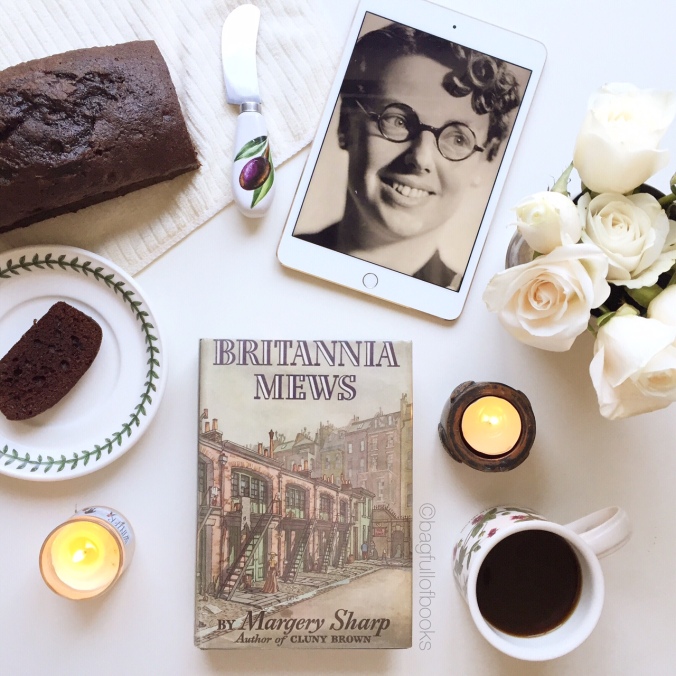
This review is written in celebration of Margery Sharp’s birthday on January 25th, 2016. I would like to thank Jane from Beyond Eden Rock for encouraging us to celebrate the life and works of a wonderful author, most of whose works remain difficult to find.
‘Britannia Mews’ is a book that describes the life and times of the central character of Adelaide Culver, a child of privileged circumstances, living in one of the row of houses along London’s Albion Place. Adjacent to Albion Place, stands Britannia Mews, once a stable, housing the horses used by the genteel folk living in Albion Place but now reduced to a slum at the turn of the nineteenth century.
Adelaide falls in love with her art teacher and aspiring artist, Henry Lambert and throwing all caution to the winds, elopes with him, to live a life of severely reduced circumstances and drudgery in a small house in Britannia Mews. In the beginning, Adelaide is happy with her new found independence, the novelty of keeping her tiny house spick and span and the belief that Henry will make a name for himself in art circles. Slowly, however, she is resigned to the fact that Henry is a drunk, with no ambition in life and has married her for no reason other than a desire to get by on Adelaide’s annual income.
When Henry Lambert falls to his death from the steps of his Mews house due to accidental circumstances, Adelaide believes she has been released from the prison that she has created for herself in Britannia Mews. She longs to go back to her parental house in the countryside. However, a devious neighbor has witnessed the slight push that Adelaide gave her husband that accidentally led to his death. This results in blackmail: the neighbour forces Adelaide to pay her ten shillings a week and compels her to stay on in the Mews.
Then as time passes on and Adelaide’s life seems very bleak she discovers real love in the most unexpected way. The strength of this attachment (with a man named Gilbert) gives her the strength to forsake everything and everyone else in her life. Adelaide and Gilbert create a Puppet Theatre in the Mew’s stables and this eventually leads to the upliftment of Britannia Mews and several of its residents. The birth of the famous Puppet Theatre leads to the gentrification of Britannia Mews. Adelaide’s success leads to great empowerment; Adelaide is envisioned as a strong inspiring woman by subsequent generations. The Theatre brings employment to several individuals and much needed entertainment to innumerable people, especially during the dark, dreary times of the Second World War. The story is brought full circle when Adelaide inspires her niece to forsake her life of comfort and luxury in rural suburbia and live a life of artistic endeavor and adventure in running the Puppet Theatre in Britannia Mews.
Set in the late nineteenth century and leading into the years spanning the Second World War, Britannia Mews is a story spanning several generations and several important world events.
The attitudes and affectations of Victorian London are very much at variance with those of subsequent times and these are highlighted in the different characters of the story.
The book focuses on the intersection of where the rich meet the poor, the difference in living conditions of the two factions, the snobbery of the upper class, the raucousness of the underbelly of London society and the dissolution of these classes with the onset of the Second World War.
Women are portrayed in strong, influential roles. They marry to please themselves, not to gratify society. Convention is severely flouted in the book ‘Britannia Mews’.
It is an astonishing novel on many levels and depicts a slice of English history that is multifaceted and rich in detail. I’ve enjoyed reading a Margery Sharp novel that is a little different from the other books I have read, but quite, quite lovely!
Lovely review (and lovely picture!) It certainly seems that Sharp was a novelist with a wide range!
LikeLiked by 1 person
Thank you! Yes she certainly showed us her ‘serious side’ with this book!
LikeLiked by 1 person
I have yet to read this one, but I love the sound of it. The more I read of Margery Sharp the more I realise that she had such a wide range, and that she really evolved over the years too.
LikeLike
Yes I agree. With this one I imagine she wanted to show that she could write serous material as well and she has done it beautifully!
LikeLiked by 1 person
Great review. And nice to find you here. Your Insta post was refreshing after a lot of Woolf birthday pictures. Glad to read your detailed reviews.
LikeLiked by 1 person
Thank you Resh! Yes the attention has been very one sided. But that’s okay. Glad you liked the review.😊
LikeLike
Pingback: A Thank you Letter after Margery Sharp Day | Beyond Eden Rock
Your reviews are lovely and insightful–thank you! I found you by way of the Margery Sharp reading event. I am always delighted to come across another reader who ‘gets’ the reason for Sharp’s appeal as a writer. Do you mind if I link to your book reviews from my Margery Sharp blog? I am always hopeful of finding other enthusiasts of her books. This is a beautiful book blog, by the way! Books of all kinds just make me happy, and your pictures represent that cheerful anticipation of a good book! Thank you so much!
LikeLiked by 1 person
Thank you so much for your lovely comment. I would be honoured if you would link my post and I am flattered that you like my reviews.
LikeLike
Pingback: An Invitation to Margery Sharp’s Birthday Party! – Beyond Eden Rock